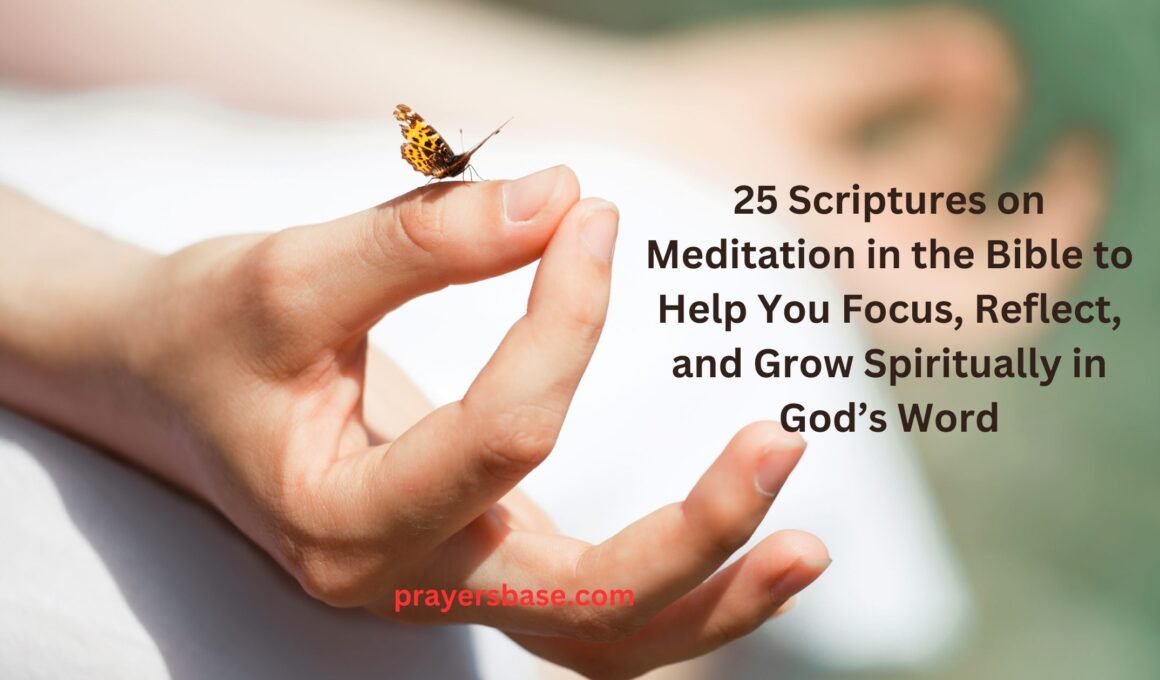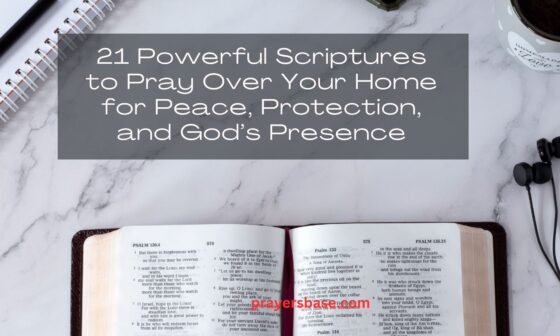Stillness is rare—but your soul needs it.
In a world of constant noise, endless scrolling, and mental overload, the practice of meditation feels more necessary than ever. But not all meditation is the same.
Biblical meditation isn’t about emptying your mind. It’s about filling it—with God’s truth.
What Is Biblical Meditation?
In Scripture, the word meditate often comes from the Hebrew terms:
“Hagah” – to mutter, ponder, speak under your breath
“Siyach” – to muse, think deeply, commune, or rehearse
Biblical meditation is an intentional act of slowing down, repeating God’s Word, and letting it soak into the heart. It involves speaking God’s truth aloud, asking questions, and listening for His voice.
Biblical Meditation vs. New Age Meditation
It’s important to understand the difference between biblical meditation and Eastern or New Age practices:
| Biblical Meditation | New Age Meditation |
|---|---|
| Focuses on God and His Word | Focuses on self, breath, or “nothingness” |
| Fills the mind with truth | Empties the mind |
| Leads to transformation by God’s Spirit | Often leads to self-realization |
| Anchored in Scripture | Detached from the Bible |
Biblical meditation is not mystical—it’s spiritual.
It’s not mindless—it’s Christ-centered mindfulness.
Why Does the Bible Encourage Meditation?
Because meditation moves God’s truth from head to heart.
“But his delight is in the law of the Lord, and on His law he meditates day and night.” — Psalm 1:2
Throughout Scripture, believers are encouraged—even commanded—to meditate on God’s Word:
To renew the mind
To grow in wisdom
To guard against sin
To deepen relationship with the Lord
In this post, you’ll find:
25 powerful scriptures on meditation in the Bible
Themes that guide your focus: God’s Word, His character, comfort in trials, and worship
Reflections and practical prompts to help you start meditating today
You don’t have to be a scholar.
You just have to be still enough to listen.
Because God still speaks—and often through His Word.
The Purpose of Meditation in the Bible
Meditation isn’t just reflection—it’s transformation.
God didn’t give us His Word so we could rush through it like headlines. He gave it so we could dwell in it, letting it shape our hearts, renew our minds, and guide our lives. Meditation is the bridge between reading the Bible and being changed by it.
1. To Deepen Understanding of God’s Word
“I will meditate on your precepts and fix my eyes on your ways.” — Psalm 119:15
Reading gives us information.
Meditation gives us revelation.
It’s where Scripture goes from black ink on white pages to living truth in our spirit. When we meditate, we slow down, notice God’s patterns, and absorb His voice.
2. To Develop Spiritual Focus and Inner Peace
“You will keep in perfect peace those whose minds are steadfast, because they trust in you.” — Isaiah 26:3
Life is loud. But the more you focus on God’s Word, the less the noise of the world dominates your thoughts. Meditation recenters your mind, quiets anxiety, and invites God’s peace to guard your soul—even in chaos.
3. To Draw Closer to God Through Scripture
“My soul will be satisfied… when I remember you upon my bed and meditate on you in the watches of the night.” — Psalm 63:5–6
Meditation is relational, not just mental.
It’s where you meet God in the quiet.
It’s where Scripture becomes conversation, not just content.
The more you dwell in His Word, the more aware you become of His nearness and love.
4. To Allow God’s Truth to Transform the Heart and Mind
“Do not conform to the pattern of this world, but be transformed by the renewing of your mind.” — Romans 12:2
Biblical meditation changes your thinking—and therefore, your living.
It helps you notice thought patterns that don’t align with truth
It renews hope where doubt lived
It redirects your desires back to God’s will
Transformation begins in the mind—and meditation is the tool.
25 Scriptures on Meditation in the Bible

Scriptures That Command or Encourage Meditation
These verses aren’t just suggestions—they’re spiritual invitations and divine directives. God doesn’t call us to casually skim His Word, but to soak in it deeply, day and night.
Here are five powerful Scriptures that directly encourage meditation:
1. Joshua 1:8
“Keep this Book of the Law always on your lips; meditate on it day and night, so that you may be careful to do everything written in it. Then you will be prosperous and successful.”
This foundational verse reveals a secret to godly success: constant, consistent meditation. Speaking the Word and reflecting on it day and night roots you in obedience and blessings.
Repeat this verse aloud three times today. What might “success” look like in your spiritual walk?
2. Psalm 1:2
“But his delight is in the law of the Lord, and on his law he meditates day and night.”
Delighting in God’s Word is a heart posture. Meditation flows not from obligation, but from love and desire. The Word becomes your joy—not just your duty.
Ask: What would it look like to delight in God’s Word like a favorite song or meal?
3. Psalm 119:15
“I will meditate on your precepts and fix my eyes on your ways.”
Meditation isn’t passive—it’s intentional focus. Fixing your eyes on God’s ways helps realign your daily decisions with His truth.
Write out a verse that recently convicted or inspired you, and “fix your eyes” on it today.
4. Psalm 119:97
“Oh, how I love your law! I meditate on it all day long.”
The psalmist wasn’t exaggerating—he was expressing devotion. When we love God’s Word, we naturally return to it throughout the day, letting it guide thoughts and emotions.
Choose one verse today and let it accompany you like a spiritual melody.
5. 1 Timothy 4:15
“Meditate on these things; give yourself entirely to them, so that your progress may be evident to all.”
Meditation brings spiritual progress—not just privately, but visibly. As you reflect and live the Word, your growth becomes a testimony to others.
What area of your spiritual life do you want to see grow? Meditate on a verse that speaks to that area.
Scriptures Showing Meditation on God’s Character
Biblical meditation isn’t limited to commands or promises—it also means dwelling on who God is: His goodness, power, mercy, and majesty. These verses invite you to turn your thoughts toward the person of God, which deepens worship and builds trust.
6. Psalm 63:6
“On my bed I remember you; I think of you through the watches of the night.”
Even at night, David’s heart was full of God. Meditation becomes especially powerful in quiet hours, when distractions fade and reflection deepens.
Before bed, take a moment to recall one way God showed up for you today.
7. Psalm 77:12
“I will consider all your works and meditate on all your mighty deeds.”
When you reflect on what God has done—creation, deliverance, miracles—faith rises. Remembering God’s history builds confidence in your present.
List 3 “mighty deeds” God has done in your life. Dwell on one today with thankfulness.
8. Psalm 145:5
“They speak of the glorious splendor of your majesty—and I will meditate on your wonderful works.”
Meditation is a form of adoration. To think on God’s glory is to refocus your soul on what truly matters: His greatness, not your problems.
Find a quiet place. Read this verse slowly, imagining God’s majesty—then praise Him for it.
9. Isaiah 26:3
“You will keep in perfect peace those whose minds are steadfast, because they trust in you.”
Meditation keeps your mind steadfast—anchored in trust, not tossed by fear. Thinking on God’s character leads to perfect peace, not just temporary calm.
What about God’s nature do you need to trust more today—His timing, mercy, or power?
10. Lamentations 3:22–23
“Because of the Lord’s great love we are not consumed… His mercies are new every morning.”
When life feels overwhelming, this verse invites you to meditate on God’s mercy—fresh, unending, and freely given.
Pause in the morning and whisper: “Thank You for new mercies today.” Then rest in them.
Scriptures Emphasizing Meditation on God’s Word
These verses highlight the power, purpose, and presence of God’s Word. When we meditate on Scripture, we aren’t just thinking—we’re letting the living Word shape, comfort, and renew us.

These passages remind us that the Bible isn’t a book to be skimmed, but a voice to be heard.
11. Psalm 119:11
“I have hidden your word in my heart that I might not sin against you.”
Hiding God’s Word doesn’t happen by accident. It comes through intentional meditation, repetition, and reflection. This protects your heart and empowers obedience.
Pick one verse today and “hide it” in your heart by repeating it often—out loud or silently.
12. Colossians 3:16
“Let the word of Christ dwell in you richly…”
To “dwell richly” means Scripture becomes more than a visitor—it becomes a resident. Letting the Word live in you means meditating on it until it shapes how you think, speak, and decide.
Choose a verse and ask: What would it look like if this verse lived in me today?
13. Proverbs 6:22
“When you walk, they will guide you; when you sleep, they will watch over you; when you awake, they will speak to you.”
God’s Word is active all day and night. Meditating on it helps it remain in your spirit, guiding your steps and even speaking into your dreams.
Place a verse where you’ll see it at night and morning—let it walk with you.
14. Psalm 19:14
“May these words of my mouth and this meditation of my heart be pleasing in your sight…”
True meditation is worshipful and relational. It’s not just for your benefit—it’s a way to honor God and offer your heart as a pleasing sacrifice.
Ask God today: “Is what I’m meditating on pleasing to You?”
15. John 15:7
“If you remain in me and my words remain in you, ask whatever you wish, and it will be done for you.”
Meditation helps God’s words remain—not just visit. When His words live in you, your desires align with His, and prayer becomes powerful.
Pause and repeat a short phrase from Scripture. Let it remain with you throughout your day.
Scriptures for Meditating During Life’s Challenges
In difficult times, our minds are often flooded with fear, doubt, and confusion. These verses redirect that mental space to truth, hope, and strength. Meditation becomes your weapon of peace and your shelter of comfort.
16. Philippians 4:8
“Whatever is true, whatever is noble, whatever is right… think about such things.”
When fear or negativity overwhelm you, this verse offers a spiritual filter. Meditation is choosing your thoughts intentionally, letting truth outweigh worry.
Write out the eight qualities in this verse and choose one to meditate on today.
17. Romans 12:2
“Do not conform to the pattern of this world, but be transformed by the renewing of your mind.”
Transformation isn’t instant. It happens as you renew your mind—again and again—with God’s truth. Meditation clears out cultural lies and replaces them with divine clarity.
What worldly thought are you replacing this week with God’s truth?
18. Isaiah 40:31
“But those who wait on the Lord shall renew their strength…”
Waiting can be wearying—unless it’s waiting with intentional reflection. Meditation while waiting turns delay into strength.
Breathe slowly. Repeat this verse phrase by phrase. Let it renew your inner strength.
19. Psalm 42:5
“Why, my soul, are you downcast?… Put your hope in God…”
This verse shows self-meditation—speaking truth to your own soul. When your emotions spiral, meditation becomes a way to counsel your heart back to hope.
Say this verse aloud, gently. Speak it to your soul until hope starts to rise again.
20. Matthew 11:28–30
“Come to me, all who are weary… and I will give you rest.”
Jesus’ words are the ultimate meditation invitation: come, slow down, learn from Him. When life is heavy, His truth becomes your rest.
Lay down every burden in prayer. Meditate slowly on the words “I will give you rest.”
Scriptures That Inspire Worship Through Meditation
Biblical meditation leads not just to peace or understanding—but to praise. These verses draw you into worship as you reflect on God’s goodness, His Word, and His ways. When we meditate with awe, our hearts sing even in silence.
21. Psalm 104:34
“May my meditation be pleasing to him, as I rejoice in the Lord.”
True meditation isn’t self-focused—it’s God-centered. It’s an act of worship, pleasing to the Father and joyful to the soul.
Pray: “Lord, let my thoughts today be an offering of worship to You.”
22. Psalm 143:5
“I meditate on all your works and consider what your hands have done.”
Meditating on God’s works—past and present—creates a foundation of gratitude. It shifts your posture from complaint to praise.
List three things God has done for you this year. Reflect on each with thanks.
23. Hebrews 4:12
“For the word of God is alive and active… it judges the thoughts and attitudes of the heart.”
Meditation brings the Word to life in you. Scripture isn’t static—it’s living and breathing, revealing truth and renewing motives.
Ask God: “What are You trying to show me through this verse today?”
24. Psalm 48:9
“Within your temple, O God, we meditate on your unfailing love.”
Worship flows from meditating on love—God’s covenantal, never-failing love. It’s the kind of love that fuels every prayer, every song, every quiet moment of reflection.
Whisper: “Your love never fails.” Repeat it until your heart believes it again.
25. Revelation 1:3
“Blessed is the one who reads aloud the words of this prophecy… and take to heart what is written in it.”
There’s a blessing in meditating on God’s Word—especially when we read it aloud and take it to heart. This verse reminds us that worship begins with listening.
Read your favorite Scripture aloud as a declaration of truth and worship today.
How to Meditate on the Word of God
Biblical meditation is simple—but sacred.
It’s not about mastering a technique. It’s about creating space in your soul for God’s voice to echo. Whether you have five minutes or fifty, here’s how you can start meditating on Scripture with intention and intimacy.
1. Read Slowly and Repeatedly
Start with one verse or short passage. Don’t rush.
Read it aloud.
Whisper it under your breath.
Read it again in another translation.
Ask:
What word or phrase stands out?
What is God highlighting for me today?
The goal isn’t to finish—it’s to absorb.
2. Reflect on What the Verse Reveals
Ask reflective, Spirit-guided questions:
What does this teach me about God’s character?
What does this reveal about my heart or situation?
What’s the promise or instruction here?
Let the Scripture become a mirror, gently showing truth and inviting response.
3. Pray the Verse Back to God
Turn meditation into conversation.
For example:
If you read Psalm 119:105 — “Your Word is a lamp to my feet…”, pray:
“Lord, light my next step. Guide me where I’m blind. Let Your Word lead me today.”
Meditation becomes powerful when you respond personally and prayerfully.
4. Journal Your Insights or Impressions
Don’t overthink it—just jot what you sensed:
A word or phrase that stirred your heart
A question the verse raised
A next step or action God is prompting
Journaling makes the Word stick. It helps you track God’s whispers, faithfulness, and personal instruction.
5. Carry It Into Your Day (or Night)
Biblical meditation doesn’t end when the journal closes.
Write the verse on a sticky note
Speak it while walking or driving
Return to it at night before bed
Let it echo. Let it lead. Let it linger in your spirit.
Benefits of Meditating on Scripture Regularly

What you dwell on shapes who you become.
And when you choose to dwell on God’s Word—day after day—it begins to transform your mind, redirect your heart, and guide your life in ways you never imagined. Here are some of the most powerful benefits of regular biblical meditation:
1. A Deepened Relationship with God
“Draw near to God and He will draw near to you.” — James 4:8
Meditation isn’t just learning about God—it’s being with Him.
As you meditate on His Word, you begin to hear His heart, feel His presence, and know His character more intimately. It’s one of the most personal and relational ways to walk with Him daily.
2. Increased Spiritual Maturity and Discernment
“Solid food is for the mature, who by constant use have trained themselves to distinguish good from evil.” — Hebrews 5:14
When you consistently reflect on God’s Word, you grow in spiritual wisdom.
You become better at discerning truth from error, making godly decisions, and resisting temptation—not because of willpower, but because your mind has been shaped by truth.
3. More Peace, Clarity, and Rest
“Great peace have those who love your law, and nothing can make them stumble.” — Psalm 119:165
The more your thoughts are filled with Scripture, the less they are ruled by fear.
Biblical meditation filters out anxiety and replaces it with peace, rest, and confidence in God’s promises.
4. A Transformed Mind and Emotions
“Be transformed by the renewing of your mind.” — Romans 12:2
Meditation renews your mental and emotional patterns.
It replaces toxic self-talk with truth, fear with faith, and chaos with clarity.
Over time, your inner world reflects the mind of Christ.
5. Strengthened Faith and Greater Endurance
“Faith comes from hearing, and hearing through the Word of Christ.” — Romans 10:17
When you meditate on Scripture, you’re not just feeding your mind—you’re feeding your faith.
And a well-fed faith leads to greater endurance in trials, deeper trust in uncertainty, and more resilience in everyday life.
Frequently Asked Questions (FAQs)
What is the biblical definition of meditation?
Biblical meditation means to ponder, dwell on, and speak softly the truths of God’s Word. Unlike passive reflection, it’s an active engagement of the heart and mind with Scripture. The Hebrew words hagah (to mutter or murmur) and siyach (to muse or commune) describe a rich, repeated focus on God and His truth.
How is biblical meditation different from Eastern or New Age meditation?
The key differences:
| Biblical Meditation | Eastern Meditation |
|---|---|
| Fills the mind with God’s Word | Empties the mind |
| Focused on Christ and truth | Often focused on self or “nothingness” |
| Leads to obedience and transformation | Often seeks detachment or self-realization |
| Rooted in Scripture | Detached from biblical foundation |
Biblical meditation is a Christ-centered discipline, not a mystical or mind-emptying experience.
Can I meditate on Scripture even if I’m new to the Bible?
Absolutely. In fact, meditation is one of the best ways to learn the Bible slowly and deeply. Start with short verses (like Psalm 23:1 or Philippians 4:6). Let one phrase speak to you each day. You don’t need theological training—just a listening heart.
How long should I meditate on a verse?
There’s no required length. You can meditate for 5 minutes or 50. The goal isn’t quantity—it’s connection. Even a few focused moments can change your mindset and open your spirit to God’s presence.
Is journaling a form of meditation?
Yes—when done with reflection and Scripture in mind. Writing down your thoughts, prayers, or impressions after reading a verse can deepen your meditation. It helps clarify what God is saying and creates space to remember what He’s done.
Conclusion
The Word of God is more than a book to study.
It’s a voice to listen to, a light to walk by, and a wellspring of peace for your soul.
And meditation is how you let that Word move from the page… to your heart… to your life.
Meditation Is a Gift and a Command
Throughout Scripture, God doesn’t just suggest meditation—He calls us to it:
“Meditate day and night…” (Joshua 1:8)
“On His law, he meditates…” (Psalm 1:2)
“Let the word of Christ dwell in you richly…” (Colossians 3:16)
Why? Because He knows the world is loud. Life is fast. And your heart needs stillness, truth, and His presence more than ever.
Let These Scriptures on Meditation in the Bible Be Your Starting Point
You’ve now seen 25 powerful verses that speak to:
Reflecting on God’s Word
Focusing on His character
Anchoring yourself during life’s challenges
Elevating your heart into worship
Now the next step is simple:
Choose one verse.
Slow down.
Meditate.
And meet God in it.
“Let the word of Christ dwell in you richly…” — Colossians 3:16
The more you meditate, the more richly it dwells.
The more richly it dwells, the more clearly you hear Him.
And the more clearly you hear Him, the more powerfully you live.










